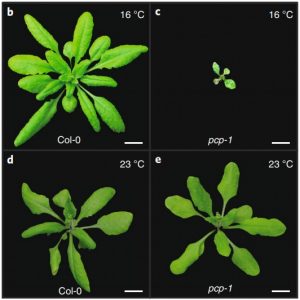PORCUPINE regulates development in response to temperature through alternative splicing ($) Nature Plants
 In this study, the authors performed strand-specific RNA sequencing of wild-type seedlings at 16°C, 23°C, and 27°C. They have found one candidate gene, a small nuclear robinucleoprotein family protein which contains a Like-Sm (LSM) domain. They named it as PORCUPINE (PCP) due to its “spiky” phenotype. As a temperature-specific mutant, pcp-1 shows dramatic developmental defects only at 16°C. Additionally, they found that WUSCHEL (WUS) expression was increased and CLAVAT3 (CLV3) expression was decreased at the same time in pcp-1 at 16°C. One may predict that as a splicing factor, PCP may alternatively splice developmentally important genes WUS and CLV3. In fact, it was not the reason and it was predicted that PCP regulates shoot apical meristem development through WUS and CLV3 in an unknown pathway. Although this article left us without mechanistic explanation, it has provided an amazing ground for future research to explore how a temperature-specific splicing factor regulates the array of genes important for plant development. (Summary by Arif Ashraf) Nature Plants: 10.1038/s41477-018-0176-z
In this study, the authors performed strand-specific RNA sequencing of wild-type seedlings at 16°C, 23°C, and 27°C. They have found one candidate gene, a small nuclear robinucleoprotein family protein which contains a Like-Sm (LSM) domain. They named it as PORCUPINE (PCP) due to its “spiky” phenotype. As a temperature-specific mutant, pcp-1 shows dramatic developmental defects only at 16°C. Additionally, they found that WUSCHEL (WUS) expression was increased and CLAVAT3 (CLV3) expression was decreased at the same time in pcp-1 at 16°C. One may predict that as a splicing factor, PCP may alternatively splice developmentally important genes WUS and CLV3. In fact, it was not the reason and it was predicted that PCP regulates shoot apical meristem development through WUS and CLV3 in an unknown pathway. Although this article left us without mechanistic explanation, it has provided an amazing ground for future research to explore how a temperature-specific splicing factor regulates the array of genes important for plant development. (Summary by Arif Ashraf) Nature Plants: 10.1038/s41477-018-0176-z



